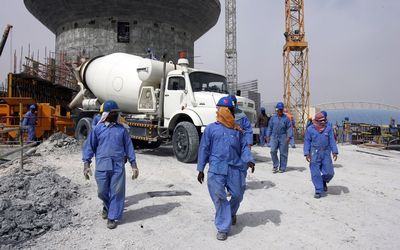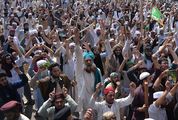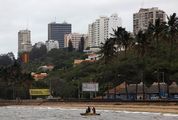Qatari slavery museum opens amid forced labour complaints
by Tom Finn,
2015-11-23 05:48:53.0
IN A traditional Qatari house in Doha, with thatched ceilings and arched doorways, a projector beams a quote by Abraham Lincoln onto a wall: "If slavery is not wrong, nothing is wrong."
The Bin Jelmood house is the first museum to focus on slavery in the Arab world, and it opens as the gas-rich Gulf monarchy faces accusations of modern-day slavery of migrant workers before the 2022 Soccer World Cup by rights groups.
Qatar has denied exploiting or abusing workers and says it has implemented labour reforms. The museum is funded by the government and was inaugurated last month.
...
LITTLE discussed in schools and official histories, slavery is tackled head-on by museum directors who believe it has too much to say about their past and future to be ignored any longer.
"Development has been so fast in Qatar; we wanted to look at how things changed, how Qatar was affected by slavery and how slaves were integrated into society," says the museum’s manager, Hafiz Abdullah.
Slavery in Qatar was abolished only in 1952, and tightly knit populations there and in other Gulf states trace their ancestry from African slaves and the Arabs who traded and owned them. The museum’s courtyard was once crowded with East African slaves, waiting to be sold. Videos and audio panels chronicle Qatar’s role in a lucrative slave trade network extending across the Indian Ocean and the ordeals of its victims: men pressed into risking their lives pearl diving in Gulf waters and workers brought by force from Africa to work on oil rigs after the Second World War.
...
ANTIQUE photos show black slaves standing beside masters and their camels, adopting the flowing robes and waist-belt daggers that marked their slow entrance into Arab culture.
Displays mark the persistence of slavery throughout the world.
An image of Nepalese labourers in blue overalls on a Doha building site has the caption: "Many construction workers in rapidly industrialising parts of the world, especially the Gulf region, are considered to be contractually enslaved."
With nearly $200bn worth of infrastructure projects planned before Qatar hosts the World Cup, hundreds of thousands of workers have been recruited from countries such as India, Nepal and Bangladesh.
Rights groups criticise Qatar’s "kafala", or work-sponsorship, system that puts foreign workers, who account for 94% of its work force, at the mercy of employers.
The museum explicitly links historic slave trading to human trafficking and bonded labour.
"The story of slavery did not end in 1952," Adullah says. "People need to focus on human exploitation today and how we can change that."
Qatar has promised reforms to the kafala system and last month amended a law on how migrant workers apply to leave the country that was hailed by local commentators.
"Qatar has abolished the last manifestation of slavery," Qatari columnist Mohammed al-Qahtani posted on Twitter, referring to the current sponsorship system as a "monopoly over human souls".
...
HUMAN Rights Watch says the reforms do not go far enough — they still require workers to get their employer’s permission to change jobs or leave the country.
In the museum’s final room, visitors are encouraged to raise a hand to symbolise their rejection of slavery and take a selfie, which is projected onto a mosaic on the wall — a gesture that may provide little comfort to low-wage workers nearby.
Joel Cabrera, a security guard from the Philippines who earns 1,200 riyals (R4,500) a month working on a building site near Bin Jelmood house, says he has not heard about the museum, but would be interested in visiting. "People have been exploited in every country throughout history. I guess it’s about whether lessons are learned from the exploitation, and how willing are people to accept that kind of thing today," he says.
Reuters

Men work on the Sport City tower in Doha. Picture: REUTERS
IN A traditional Qatari house in Doha, with thatched ceilings and arched doorways, a projector beams a quote by Abraham Lincoln onto a wall: "If slavery is not wrong, nothing is wrong."
The Bin Jelmood house is the first museum to focus on slavery in the Arab world, and it opens as the gas-rich Gulf monarchy faces accusations of modern-day slavery of migrant workers before the 2022 Soccer World Cup by rights groups.
Qatar has denied exploiting or abusing workers and says it has implemented labour reforms. The museum is funded by the government and was inaugurated last month.
...
LITTLE discussed in schools and official histories, slavery is tackled head-on by museum directors who believe it has too much to say about their past and future to be ignored any longer.
"Development has been so fast in Qatar; we wanted to look at how things changed, how Qatar was affected by slavery and how slaves were integrated into society," says the museum’s manager, Hafiz Abdullah.
Slavery in Qatar was abolished only in 1952, and tightly knit populations there and in other Gulf states trace their ancestry from African slaves and the Arabs who traded and owned them. The museum’s courtyard was once crowded with East African slaves, waiting to be sold. Videos and audio panels chronicle Qatar’s role in a lucrative slave trade network extending across the Indian Ocean and the ordeals of its victims: men pressed into risking their lives pearl diving in Gulf waters and workers brought by force from Africa to work on oil rigs after the Second World War.
...
ANTIQUE photos show black slaves standing beside masters and their camels, adopting the flowing robes and waist-belt daggers that marked their slow entrance into Arab culture.
Displays mark the persistence of slavery throughout the world.
An image of Nepalese labourers in blue overalls on a Doha building site has the caption: "Many construction workers in rapidly industrialising parts of the world, especially the Gulf region, are considered to be contractually enslaved."
With nearly $200bn worth of infrastructure projects planned before Qatar hosts the World Cup, hundreds of thousands of workers have been recruited from countries such as India, Nepal and Bangladesh.
Rights groups criticise Qatar’s "kafala", or work-sponsorship, system that puts foreign workers, who account for 94% of its work force, at the mercy of employers.
The museum explicitly links historic slave trading to human trafficking and bonded labour.
"The story of slavery did not end in 1952," Adullah says. "People need to focus on human exploitation today and how we can change that."
Qatar has promised reforms to the kafala system and last month amended a law on how migrant workers apply to leave the country that was hailed by local commentators.
"Qatar has abolished the last manifestation of slavery," Qatari columnist Mohammed al-Qahtani posted on Twitter, referring to the current sponsorship system as a "monopoly over human souls".
...
HUMAN Rights Watch says the reforms do not go far enough — they still require workers to get their employer’s permission to change jobs or leave the country.
In the museum’s final room, visitors are encouraged to raise a hand to symbolise their rejection of slavery and take a selfie, which is projected onto a mosaic on the wall — a gesture that may provide little comfort to low-wage workers nearby.
Joel Cabrera, a security guard from the Philippines who earns 1,200 riyals (R4,500) a month working on a building site near Bin Jelmood house, says he has not heard about the museum, but would be interested in visiting. "People have been exploited in every country throughout history. I guess it’s about whether lessons are learned from the exploitation, and how willing are people to accept that kind of thing today," he says.
Reuters























Change: 1.37%
Change: 1.32%
Change: 2.91%
Change: 0.45%
Change: 3.09%
Data supplied by Profile Data
Change: 1.63%
Change: 0.83%
Change: 1.37%
Change: 0.00%
Change: 0.69%
Data supplied by Profile Data
Change: -2.04%
Change: -1.78%
Change: -1.55%
Change: -1.86%
Change: -1.48%
Data supplied by Profile Data
Change: -1.19%
Change: 0.31%
Change: -0.65%
Change: -1.39%
Change: 2.92%
Data supplied by Profile Data